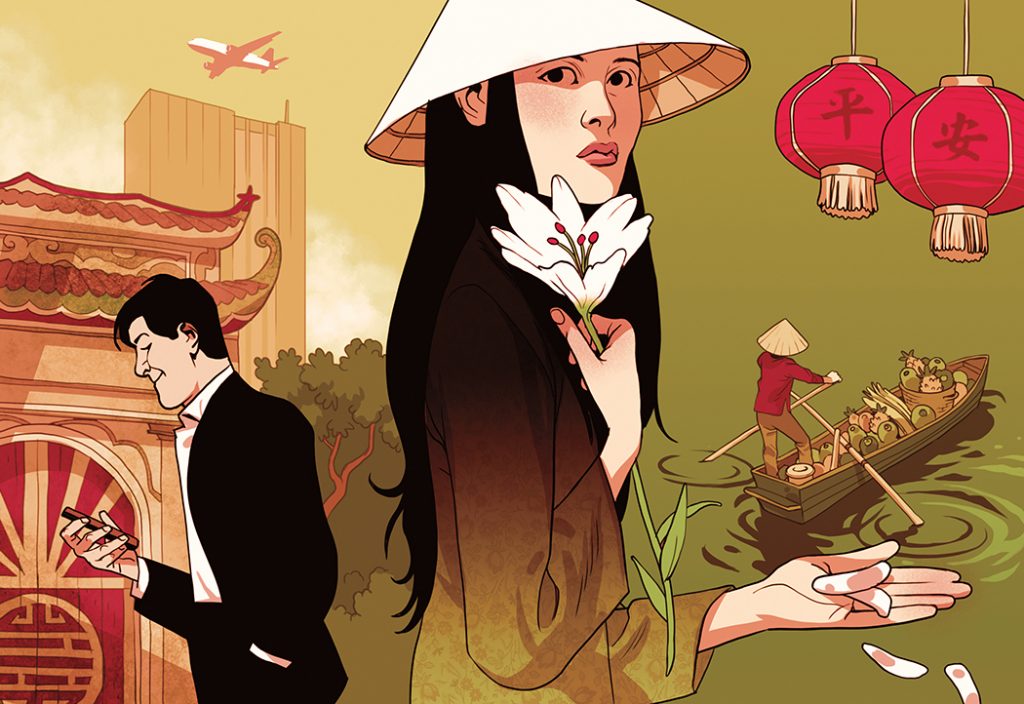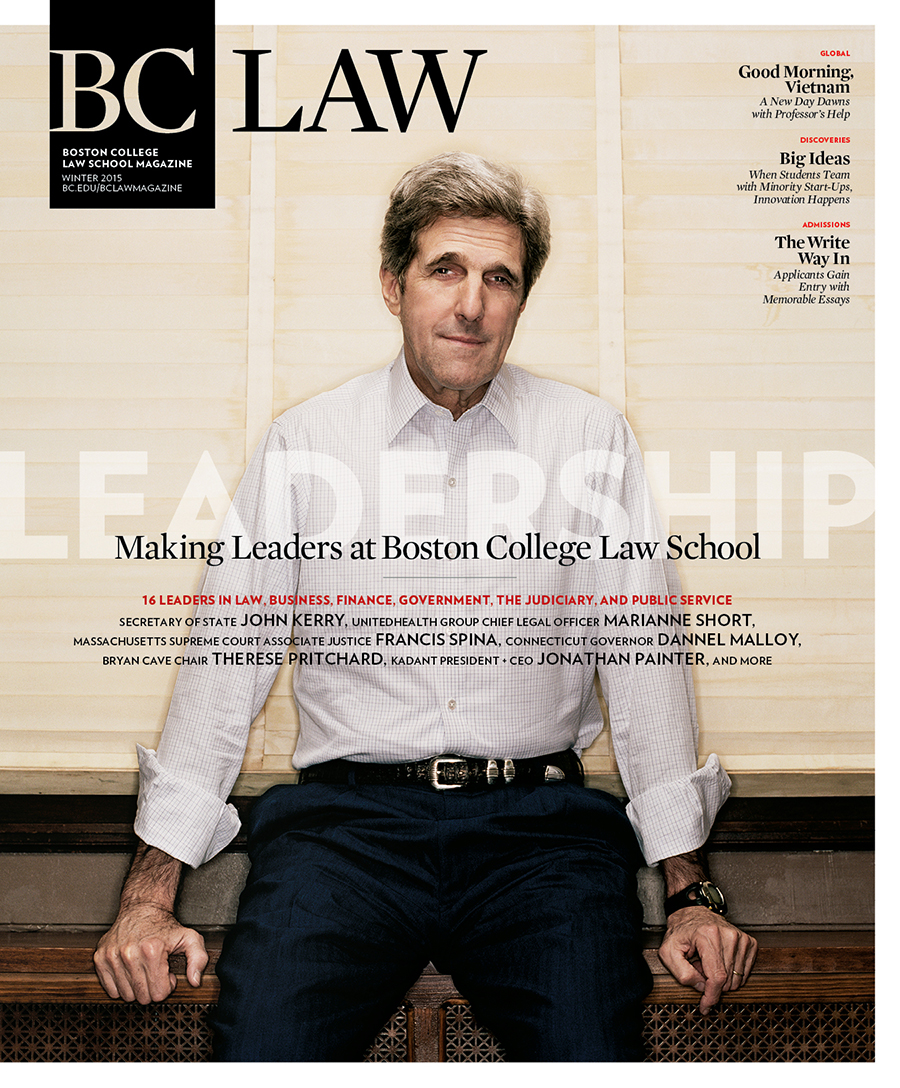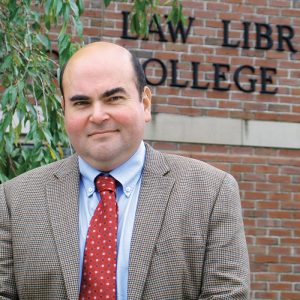Among his many distinctions, Professor Brian Quinn can probably claim to be the only American academic, let alone the only corporate law expert, to have published a law review article about the Vietnamese pomelo trade. The story of how he came to write it is more or less the story of his adult life, from an undergraduate intern to an innovator in Vietnamese higher education.
The internship, during his sophomore year at Georgetown, took him to the Philippines, where he worked with Vietnamese refugees. “When a boat arrived,” he says, “I organized the retrieval of refugees and bussed them or trucked them to the camp. I learned a little Vietnamese, things like ‘Get off the truck’ and ‘Who are your parents?’”
After his return, Georgetown agreed to student exchanges with the University of Hanoi. Quinn spent his senior year there, steeping himself in Vietnamese culture and history. It was 1989, and many Americans still saw Vietnam as an enemy; the countries lacked diplomatic relations, and a US trade embargo was in effect. Yet Vietnam was changing internally, moving rapidly away from central planning toward a market economy.
With few Americans in the country, Quinn acted as a citizen-diplomat, practicing his Vietnamese on everyone he met, gratefully accepting dinner invitations. He picked up enough of the language and culture that, after his return home, Harvard’s Institute for International Development hired him to fly to Europe, meet up with Vietnamese diplomats, and escort them to the US. “I had a suit and a passport,” he recalls, “and that’s what was required.”
In the early 1990s, the beginning of a US-Vietnamese thaw, Quinn, then a student at Harvard’s JFK School, was again pressed into service, this time to accompany Americans like Edmund Muskie, the former secretary of state, to Vietnam.
“The Vietnamese leaders were all educated in the Soviet Union and Eastern Europe. The only tools they had were tools related to central planning. The idea was to educate them about institutions and how they could change to adapt to new environments.” —Professor Brian Quinn
During that time, Senators John Kerry ’76 and John McCain, both Vietnam veterans, were urging Vietnam to share information on missing American servicemen, in return for which the US would move toward ending the embargo and reopening diplomatic relations. Vietnam, Quinn recalls, “let the US have all the information that existed, and the US response was nothing. Internal US politics made it difficult for the US to move.”
As a sort of consolation prize, the US agreed to fund an economics school for Vietnamese officials. In its first years, the Fulbright Economics Teaching Program (FETP), in Ho Chi Minh City, was led by Brian Quinn. “The Vietnamese leaders were all educated in the Soviet Union and Eastern Europe,” he says. “The only tools they had were tools related to central planning. The idea was to educate them about institutions and how they could change to adapt to new environments.”
Some Vietnamese saw FETP as a plot against their political system, and during its early days, Quinn’s mail was opened, his phone calls tapped. He says, “I had a bad habit of speaking quickly on the phone.…One time I went to a monthly meeting with the ministry of foreign affairs, and they said, ‘When you speak on the phone, slow down. We can’t keep up with you.’”
The diplomatic freeze and trade embargo had ended by 1995, but the Fulbright educational program endured. “We have had very good students who went back to their [agencies] and enacted good policy,” says Quinn.
After six years at FETP, he felt the program needed a law component, and he enrolled in Stanford Law School. He liked it a bit more than he had expected. After graduation, he spent two years at a California law firm, working on mergers and acquisitions. Then he went into the teaching of law, arriving at Boston College Law School in 2008. He teaches corporate law—an area in which he has published extensively—in addition to courses on business transactions and corporate mergers and acquisitions.
Quinn stayed engaged with FETP, though, frequently returning to Vietnam to help the staff with teaching and research. His pomelo article comes from the post-Stanford period. While visiting Vietnam, he says, “I got roped into a wedding party and ended up on a pomelo farm. It struck me as an interesting question: How do the farmers organize their business relations in the absence of law—law in the strictest sense.” The article, “Farmers, Middlemen, and the New Rule of Law Movement,” published in 2010 in the Boston College Third World Law Journal, is one of four articles on Vietnamese law that he’s published in the last dozen years or so. It describes the informal mechanisms by which the farmers protect themselves from dishonest fruit brokers in a country where courts are slow, ineffective, and sometimes corrupt. Its subtext, he says, is his skepticism about the “rule of law” movement.
Next summer, Quinn plans to return to Vietnam, this time with twelve Boston College undergrads. Under the auspices of BC’s Office of International Programs, the students will take classes, taught by Quinn, and visit local factories, farms, and law courts. “We’re hoping,” he says, “that they begin to appreciate the challenges of development and the role that institutions, soft and hard, can play in making sure development happens.”
Meanwhile, Quinn serves on the board of a nonprofit that aims to turn the one-year Fulbright program into a full-fledged university. That means raising money and combing Vietnam for able instructors and administrators. Quinn’s vision for the new school reflects the existing school’s emphasis on market competition. “We want to establish a center of excellence,” he explains, “to push competing universities to be better—to create the mental space for them to consider how their institutions could be run more effectively.”
To view a related video, go to bc.edu/lawmagvideos.




